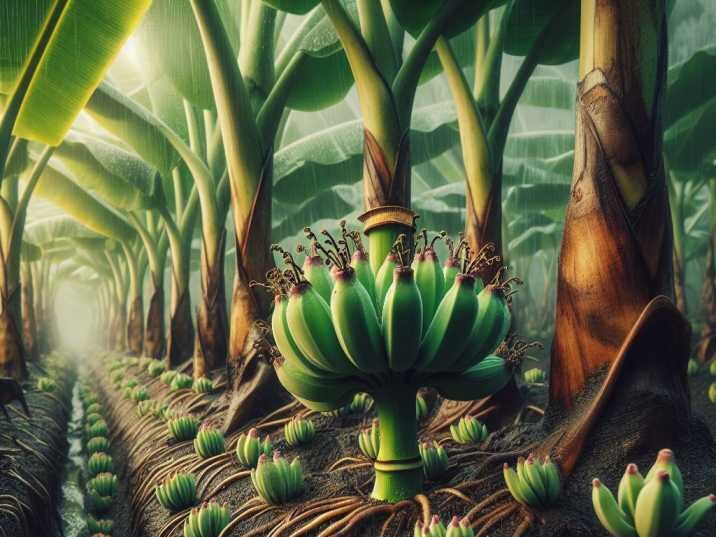Introduction:
Table of Contents
In the lush landscapes of banana-growing regions, a remarkable phenomenon unfolds beneath the soil’s surface. Here, amidst the verdant plantations, baby bananas play a crucial role in nurturing the very earth that sustains them. From enhancing soil fertility to promoting biodiversity, these miniature fruits wield a significant influence on the agricultural landscape. Let’s delve into the fascinating world Discover how baby bananas enhance soil health in banana-growing regions.

Understanding the Role of Baby Bananas
The Marvel of Baby Bananas
Baby bananas, also known as “dwarf” or “finger” bananas, are diminutive versions of their larger counterparts. Despite their small size, these fruits pack a nutritional punch and are prized for their sweet flavor and creamy texture. While they may be small in stature, their impact on soil health is anything but insignificant.
The Significance of Soil Health in Banana-Growing
Before we explore the specific ways in which baby bananas influence soil health, it’s essential to understand the importance of soil in agricultural ecosystems. Soil serves as a vital medium for plant growth, providing essential nutrients, water retention, and support for root systems. Healthy soil is the foundation of sustainable agriculture, ensuring the long-term productivity and resilience of crops.
Enhancing Soil Fertility
Nutrient Cycling
One of the key contributions of baby bananas to soil health is their role in nutrient cycling. As these fruits ripen and decompose, they release essential nutrients back into the soil, including potassium, phosphorus, and nitrogen. These nutrients are then made available to other plants, promoting overall fertility and productivity.
Organic Matter Accumulation
Baby bananas also contribute to the accumulation of organic matter in the soil. Their decomposing peels add organic material to the soil, improving its structure and enhancing its ability to retain moisture and nutrients. This organic matter serves as food for soil microorganisms, further enriching the soil ecosystem.
Promoting Biodiversity
Habitat Enhancement
The presence of baby banana plants in banana-growing regions creates microhabitats that support a diverse range of plant and animal species. These miniature banana plants provide shelter, food, and nesting sites for various organisms, contributing to overall biodiversity in the ecosystem.
Beneficial Microorganisms
Healthy soil teems with a vast array of microorganisms, including bacteria, fungi, and earthworms, that play crucial roles in nutrient cycling, soil structure formation, and disease suppression. Baby bananas foster conditions favorable to these beneficial microorganisms, promoting a thriving soil ecosystem.
Sustainability in Agriculture
Reduced Environmental Impact
By enhancing soil health and promoting biodiversity, baby bananas contribute to more sustainable agricultural practices. Healthy soils require fewer inputs such as fertilizers and pesticides, reducing the environmental footprint of banana cultivation and preserving natural resources.
Resilience to Climate Change
As climate change poses increasing challenges to agriculture, building resilient farming systems becomes imperative. Healthy soils nurtured by baby bananas are better equipped to withstand environmental stresses such as drought, flooding, and temperature fluctuations, ensuring the long-term viability of banana-growing regions.
Table of Information soil health in banana-growing:
| Topic | Details |
|---|---|
| Nutrient Cycling | Baby bananas release essential nutrients such as potassium, phosphorus, and nitrogen back into the soil as they decompose. |
| Organic Matter Accumulation | Baby bananas contribute to the accumulation of organic matter in the soil, improving its structure and moisture retention. |
| Habitat Enhancement | Baby banana plants create microhabitats that support a diverse range of plant and animal species, promoting biodiversity. |
| Beneficial Microorganisms | Baby bananas foster conditions favorable to beneficial soil microorganisms, which play crucial roles in nutrient cycling and soil health. |
| Reduced Environmental Impact | Healthy soils nurtured by baby bananas require fewer inputs such as fertilizers and pesticides, reducing the environmental footprint of banana cultivation. |
Conclusion:
In conclusion, the impact of baby bananas on soil health in banana-growing regions cannot be overstated. These miniature marvels play a multifaceted role in enhancing soil fertility, promoting biodiversity, and fostering sustainability in agriculture. By harnessing the power of nature’s smallest treasures, farmers can cultivate healthy soils that support thriving ecosystems and resilient food systems for generations to come.
FAQs:
- What are baby bananas? Baby bananas, also known as dwarf or finger bananas, are small-sized bananas prized for their sweet flavor and creamy texture.
- How do baby bananas impact soil health? Baby bananas contribute to soil health by enhancing fertility, promoting biodiversity, and fostering sustainability in agricultural ecosystems.
- Why is soil health important in banana-growing regions? Soil health is essential for sustainable agriculture as it provides vital nutrients, water retention, and support for plant growth, ensuring the long-term productivity of crops.
- What are the environmental benefits of baby bananas? Baby bananas help reduce the environmental impact of banana cultivation by requiring fewer inputs such as fertilizers and pesticides, thus preserving natural resources.
- How can farmers harness the benefits of baby bananas for soil health? Farmers can maximize the benefits of baby bananas by incorporating sustainable agricultural practices such as organic farming, crop rotation, and mulching to promote soil health and resilience.
